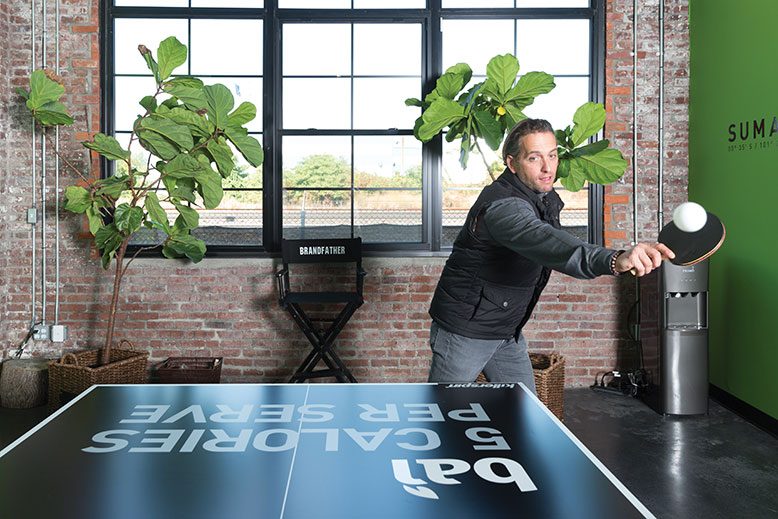
If you shopped at Princeton health-food stores, gourmet shops or the town’s Whole Foods in 2009, you may recall a slim, energetic young man sitting at a table offering samples of an antioxidant-rich, fruit-flavored soft drink and asking what you thought of it.
That man, Ben Weiss, is now founder and CEO of Bai Brands, whose core product—the Bai5 line of low-cal, antioxidant-rich, naturally flavored soft drinks—came out of those table talks. Bai5’s distinguishing ingredient is an extract made from the pulp that surrounds the seeds (beans) of the coffee plant. This endocarp, or coffeefruit, as industry people call it, is often discarded. But it is rich in polyphenols, a potent antioxidant.
Bai means “pure” in Mandarin, but is pronounced “buy,” which is what its devotees are doing in droves.
Last January, Forbes ranked Bai Brands number 13 on its 2015 list of America’s Most Promising Companies. According to Forbes, the Hamilton-based company had 2014 sales of $48.1 million. According to Weiss, who lives in Princeton with his wife, Danna, and two children, “We’ll be $125 million in sales this year.”
Bai’s surging growth clearly owes something to its 2014 national distribution deal with industry giant Dr Pepper Snapple Group. It also owes something to what Weiss learned in those table talks. “I set out to do a mid-calorie drink,” he says, “but one thing that caught my attention early was people’s lack of desire for sugar.”
So he went low calorie by sweetening with natural stevia leaf (as other brands do, lately including Coke Life and Pepsi True). To offset the slight bitterness of stevia, he added 2 grams of cane sugar per 18-ounce bottle and other natural flavorings, including erythritol, a naturally sweet sugar alcohol that has no calories, no ethanol (i.e. booze) and doesn’t spike blood sugar.
Bai5 contains some white-tea extract, which, like the coffeefruit, contributes antioxidants and caffeine. Each bottle has 70 grams of caffeine, is kosher and vegan, and is free of GMOs, gluten and allergens (except for coconut in the Molokai Coconut flavor). Bai5 gets its name from having 5 calories per 8-ounce serving, for slightly more than 10 calories per bottle.
But Bai5’s biggest point of differentiation is found in the two words that appear under its logo: Antioxidant infusions. Weiss came across them fairly early in his career.
Now 45, he grew up on Staten Island and earned a bachelor’s degree in finance in 1992 from Boston University. Somewhere along the line, “I had an epiphany that I wanted to be in coffee.” A brief stint at a bank convinced him it “would never make me happy, nor would I ever be great at it. Literally, I just wanted to open a coffeehouse in New York, and I studied to do that.”
But he never did. “I stayed in the industry,” he says. “I worked with Godiva on their Café Godiva line, then created a beverage they still sell called Chocolixir. I dreamed it up in my kitchen. That’s kind of been my thing. I create ideas in and around beverages.”
Being involved with coffee, Weiss knew about coffeefruit and the clear, flavorless, polyphenol-rich extract that can be produced from it. The cosmetics and nutraceutical industries were onto it as well, using it as an “anti-aging” and anti-inflammatory ingredient.
“In 2008,” Weiss says, “I had the idea of repurposing coffeefruit as a functional ingredient in a drink.” He has his extract made in Indonesia from discarded coffeefruit. “The soil is volcanic,” he says. “I think it produces the best coffee and the best coffeefruit.”
That drink, in mid-calorie form, is what he asked Princeton consumers to try in 2009. By the end of that summer, he had figured out “how to make low-cal taste really good,” and Princeton store owners began stocking it. Bai5 drinks are just 2 to 6 percent juice, but they have a bright, fresh taste that gets your attention.
“My father was my first salesperson,” he says. “Me and my dad were running around Princeton knocking on doors. We had the right community at our fingertips to incubate this brand. For that, I’ll always be indebted.”
Weiss calls himself “a disrupter.” The industry he was looking to disrupt—soda—was already in the midst of a sales slide that began in 2004 and continues today.
“Consumers were beginning their mass exodus from sodas,” he says. “Bottled water is taking a lot of the share of stomach that soda used to occupy. People no longer want to drink their calories, especially millennials. The problem with water as a safe haven, though, is that people get bored.”
Enter Bai5, which comes in 10 brightly flavorful, if misleadingly named, varieties like Congo Pear, Brasilia Blueberry and Panama Peach. “It’s not that pears grow in Congo,” Weiss admits. “The names pay playful homage to different coffee-growing regions.” A blurb to that effect appears deep in the Bai5 section of the drinkbai.com FAQ.
Enter, also, Bai Bubbles, seven carbonated flavors; and starting in January, Bai Antiwater. It, too, is infused with coffeefruit extract and, Weiss says, “is super purified and aseptically processed.
“We’re not about sourcing the water from some far-away island,” he adds. “This is a water that has been touched by man, and is very proud of it.” If Bai needs a byword, ”touched by man, and proud of it” could do nicely.
